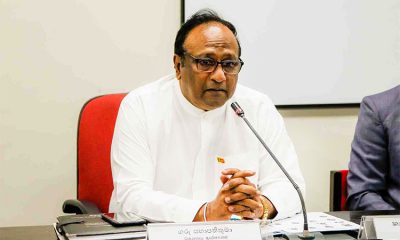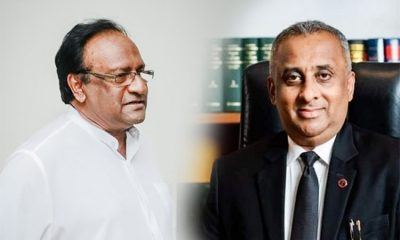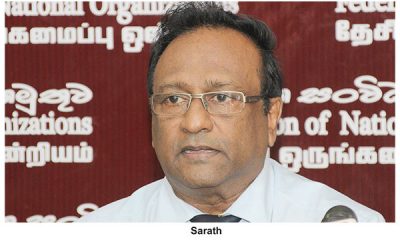News
Canadian interference alleged in Kurundi temple dispute as Ottawa reiterates genocide charge
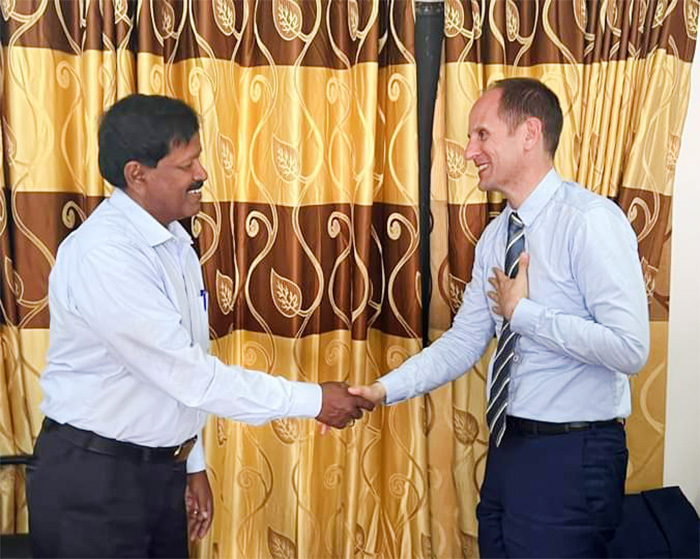
Jawaharlal Nehru University facilitates talk on ‘structural genocide’
By Shamindra Ferdinando
SLPP MP retired Rear Admiral Sarath Weerasekera yesterday (24) accused Canadian High Commissioner Eric Walsh of backing those propagating separatist sentiments.
The former Public Security Minister, who is also the Chairman of the Parliamentary Oversight Committee on National Security, claimed that the HC’s recent visit to the Northern Province was intended to further divide the communities.
The one-time Chief of Staff of the SLN was critical of what he called the Canadian interference in the continuing dispute over the Kurundi temple in former LTTE bastion Mullaitivu.
Weerasekera found fault with the Wickremesinghe-Rajapaksa government for its failure to take up the issue at hand with the Canadian government. The Foreign Ministry had to explain how it intended to counter external interference with the country’s internal affairs, the MP said.
The Island raised the accusations directed at Canadian HC Eric Walsh with the HC spokesperson. We received the following response: “Meeting people in different parts of the country, to better understand their priorities and perspectives, is a normal part of a High Commissioner’s role.”
Referring to the recent presidential pardon granted to two LTTE cadres, convicted of the 1996 suicide attack on the Central Bank, MP Weerasekera said the government was going out of its way to appease the LTTE rump and the pro-LTTE activists overseas while they continued their Western-backed campaign against Sri Lanka.
MP Weerasekera said that the government should be seriously concerned about the Canadian HC meeting former Northern Provincial Council Member T. Raviharan, who is spearheading the protest against the Kurundi temple. Pointing out that the matter was now before the Court of Appeal, the former Minister said that the whole issue should be reviewed against the backdrop of Canada’s shocking declaration of genocide against Tamil people here.
Canadian Parliament in 2022 declared May 18 as Tamil Genocide Remembrance Day. Responding to The Island queries, MP Weerasekera pointed out that Canadians exploited the current political-economic-social crisis to the hilt. “The statements issued by Canadian PM Justin Trudeau and HC Walsh to mark the Black July riots of 1983 showed how conveniently they forgot the origins of terrorism here,” an irate Weerasekera said, adding that as a nation Sri Lanka should be ashamed of its failure to set the record straight.
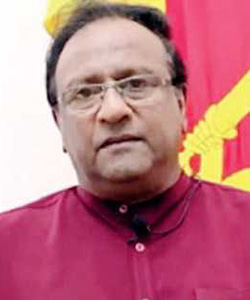
Sarath Weerasekera
HC Walsh tweeted on Sunday, July 23: “Today, we remember the victims of anti-Tamil violence that spread across Sri Lanka forty years ago. The wounds from July 1983 have yet to heal. Acknowledging these terrible events and commemorating the victims are vital steps towards inclusivity and sustainable prosperity in Sri Lanka. We’ll continue to support the efforts of all who are working toward these goals.”
In his statement, PM Trudeau, having declared their intention to push for accountability for human rights violations in Sri Lanka, underscored that Tamil Genocide Remembrance Day was marked for the first time this year.
Canada has conveniently forgotten that the public went on a rampage after a group of Indian-trained LTTE terrorists wiped out an Army patrol at Thinnaveli, Jaffna, killing 13 soldiers. Would Canada also demand accountability for thousands of deaths caused due to Indian intervention, and from the Tamil community, for assassination of former Indian Prime Minister Rajiv Gandhi? MP Weerasekera asked. How could they raise this issue without referring to the deployment of the Indian Army here (July 1987-March 1990) in the Northern and Eastern Provinces where thousands perished at a time the Sri Lankan military was confined to barracks in terms of the Indo-Lanka Accord, the SLN veteran queried.
The Canadian PM couldn’t be unaware that India lost well over 1,000 men in Sri Lanka and nearly 3,000 wounded, the MP said. That would have been sufficient to understand the losses suffered by the Tamil community here.
The ex-Minister said that in his capacity as Chairman of the Parliamentary Oversight Committee on National Security he intended to raise the entire gamut of issues with the Foreign Ministry. Asked whether he was confident of securing the support of other political parties to pursue the accountability challenge, MP Weerasekera said that he was pushing for Parliament to adopt a resolution against Canada over the Canadian Parliament resolution claiming that genocide took place in Sri Lanka. The MP said: “I handed over a Private member’s motion in this regard to the Secretary General of Parliament Kushani Rohanadeera.”
MP Weerasekera said that he didn’t talk about how Canada treated its indigenous people, including children.
The MP said that in Parliament last week he called for the expulsion of HC Walsh for meddling in domestic affairs. Canada was pursuing an extremely dangerous agenda, MP Weerasekera said, alleging that their declaration of genocide would influence anti-Sri Lanka sentiments the world over.
The former Minister pointed out the Black July 1983 Remembrance, titled ‘A structural genocide and ethnic cleansing of Tamil Hindus’ held at Jawaharlal Nehru University yesterday (Monday July 24) emphasized the growing danger. Such events gave credence to unsubstantiated allegations especially when a State University got involved, MP Weerasekera said. He pointed out this happened soon after President Ranil Wickremesinghe’s visit to New Delhi.
Then the Indian media recently quoted BJP State President K Annamalai as having said that he was concerned about the declining Hindu population in the north and eastern provinces of Sri Lanka, where Tamils form the majority, MP Weerasekera said.
This silly statement was made in a speech Annamalai made in a chamber of the House of Lords, the MP said, alleging that such declarations were meant to increase pressure on Sri Lanka. The BJP official should know a sizable Tamil population lived among the Sinhalese in the South and the LTTE was responsible for forcing the Muslim community out of the Northern Province in Oct./Nov. 1990, MP Weerasekera said.
News
Financial assistance of USD 01 Million for the Disaster-Affected People of Myanmar
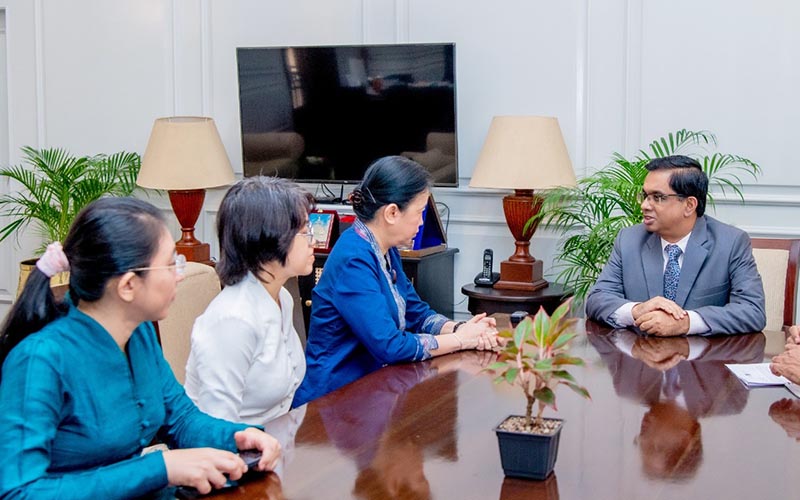
The Government of Sri Lanka has extended financial assistance amounting to USD 01 Million to provide relief to the people of Myanmar affected by the recent earthquake.
The relevant cheque was officially handed over by the Secretary to the President, Dr. Nandika Sanath Kumanayake, to the Ambassador of Myanmar to Sri Lanka, Marlar Than Htaik.on Thursday (10) at the Presidential Secretariat.
Despite the prevailing economic challenges in Sri Lanka, the Ambassador of Myanmar expressed her deep appreciation to President Anura Kumara Disanayake and the Government of Sri Lanka for this gesture of solidarity and support towards the disaster-stricken people of Myanmar.
Furthermore, the Ambassador extended her gratitude for Sri Lanka’s decision to deploy relief teams and medical personnel during this difficult time. She also noted that such acts of compassion further strengthen the longstanding religious and cultural friendship between Sri Lanka and Myanmar.
The Ambassador also briefed the Secretary to the President on the current situation in Myanmar following the earthquake.
Senior Additional Secretary to the President, Roshan Gamage, along with officials from the Embassy of Myanmar, Winh Wint Khaus Tun and Ms. Lei Yi Win, were also present at this occasion.
[PMD]
News
Indo-Lanka MoUs unlikely to be tabled in Parliament any time soon
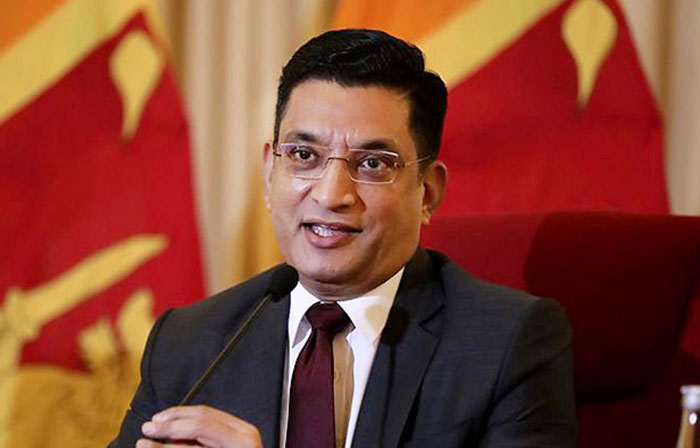
…of seven SOCs only one constituted so far
Sri Lanka’s controversial MoU on Defence Cooperation with India was unlikely to be taken up any time soon in Parliament in spite of the House Sectoral Oversight Committee (SOC) on Governance, Justice and Civil Protection that has been assigned defence, authoritative sources told The Island.
Of the seven SOCs only one was activated with the recent election of Dr. Najith Indika, MP, as the Chairman of the Sectoral Oversight Committee on Governance, Justice, and Civil Protection of the Tenth Parliament.
The inaugural meeting of the current parliament was held on 21 Nov., 2024.
Sources said that the parliament had met for the last time yesterday (10) before the Sinhala and Tamil New Year holiday. It is scheduled to meet again on May 8.
The UNDP that has financially backed the establishment of the SOC system to help strengthen the role of the parliament recently reached a consensus with the government to reduce the number of SCOCs from 17 to seven. The Island, in writing, asked for the UNDP’s reaction to the operation of SOCs but had not received a response at the time this edition went to press.
The SOCs have the power to examine any Bill, except the Bills defined in Article 152 of the Constitution, Treaty, Reports including the Annual and Performance Reports relating to the institutions coming under its purview or any other matter referred to the Committee by Parliament or any Committee or a Minister relating to the subjects and functions within their jurisdiction.
Sources said that out of the seven SOCs only one had been activated during the past five months though the government and the Opposition agreed to share the leadership of them.
Accordingly, it was agreed that the government would appoint chairpersons to four SOCs –– Economic Development and International Relations, Health, Media and Women’s Empowerment, Science, Technology and Digital Transformation and Governance, Justice and Civil Protection .
It was also agreed that the Opposition would appoint chairpersons to the SOCs on Infrastructure and Strategic Development, Education, Manpower and Human Capital, and Environment, Agriculture and Resource Sustainability to the Opposition.
India and Sri Lanka on April 5 signed six MoUs on HVDC interconnection for import/export of power, cooperation in the field of sharing successful digital solutions implemented at population scale for digital transformation, defence cooperation, multi sectoral grant assistance for Eastern province, health and medicine and pharmacopoeia cooperation. In addition to them, India, Sri Lanka and UAE signed a tripartite MoU cooperation in development of Trincomalee as an energy hub.
The Island asked Ali Sabry, PC, who served as foreign minister during Ranil Wickremesinghe’s tenure as the President (July 2022 to Sept 2024) whether the seven MoUs had been discussed during that period. We also asked him whether those MoUs should have been discussed at SOCs before finalisation.
Sabry said: “Most of the MOU to my knowledge were discussed except the one on Defence Cooperation, which I am unaware of. General procedure is the relevant line ministry prepares the initial draft and gets the input from the Foreign Ministry and goes for stakeholder consultation of all ministries and agencies involved. Then the President’s Office grants its sanction and with the approval of the AG, it goes before the cabinet of ministers. With Cabinet approval, the government could sign the MOU.”
Sabry said that he was of the opinion that once the government signed a particular MoU, it should be placed before the parliament. “MOU’s are generally not legally binding and only signify the desire to work together. If the signed MoUs were to be implemented, then they have to be followed by agreements or laws.”
He emphasised the pivotal importance of transparency in the whole process. The ex-minister said: “I think transparency is crucial in these matters. Concealment leads to speculation and assumption of the worst. The MOUs should be tabled in Parliament for public information. Discussion at the relevant SOCs would have been helpful. There are growing fears fueled by lack of information in the public domain. This is a private comment, not to be attributed to me.
Asked whether MoUs, particularly the ones on defence and energy had to be approved by the Attorney General, the former minister said that the AG has to advise the MoUs compatibility with the Constitution. “But Article 157 of the Constitution does not apply; the 2/3 majority stipulated there envisages only investment treaties.” Foreign Minister Vijitha Herath assured Parliament on April 8 that the AG had cleared all seven MoUs and none of them were inimical to the country.
By Shamindra Ferdinando
News
LG polls: Appeal Court orders EC to accept 35 additional nomination papers
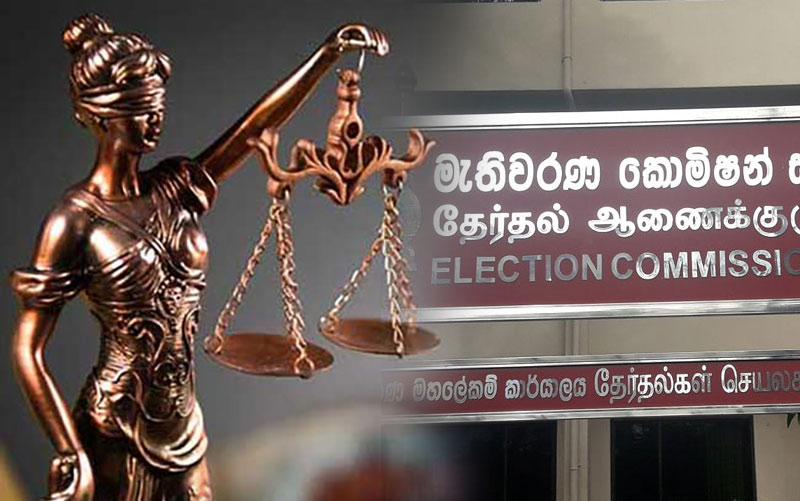
The Court of Appeal yesterday ordered the Election Commission (EC) to accept 35 additional nomination papers for the 2025 local government elections, which had been previously rejected by election officials.
The ruling was issued yesterday by a bench comprising Acting President of the Court of Appeal, Justice Mohamed Lafar Tahir, and Justice Priyantha Fernando. The court ordered the relevant Returning Officers to accept the nominations following hearings on several petitions filed by political parties and independent groups challenging the rejections.
Last week, the Court of Appeal ordered the EC to accept 37 previously rejected nomination papers.
by A.J.A. Abeynayake
-

 Business4 days ago
Business4 days agoColombo Coffee wins coveted management awards
-

 Business6 days ago
Business6 days agoDaraz Sri Lanka ushers in the New Year with 4.4 Avurudu Wasi Pro Max – Sri Lanka’s biggest online Avurudu sale
-

 Features5 days ago
Features5 days agoStarlink in the Global South
-

 Business6 days ago
Business6 days agoNew SL Sovereign Bonds win foreign investor confidence
-

 Features2 days ago
Features2 days agoSri Lanka’s Foreign Policy amid Geopolitical Transformations: 1990-2024 – Part III
-

 Features5 days ago
Features5 days agoModi’s Sri Lanka Sojourn
-

 Midweek Review2 days ago
Midweek Review2 days agoInequality is killing the Middle Class
-

 Features4 days ago
Features4 days agoSri Lanka’s Foreign Policy amid Geopolitical Transformations: 1990-2024 – Part I




